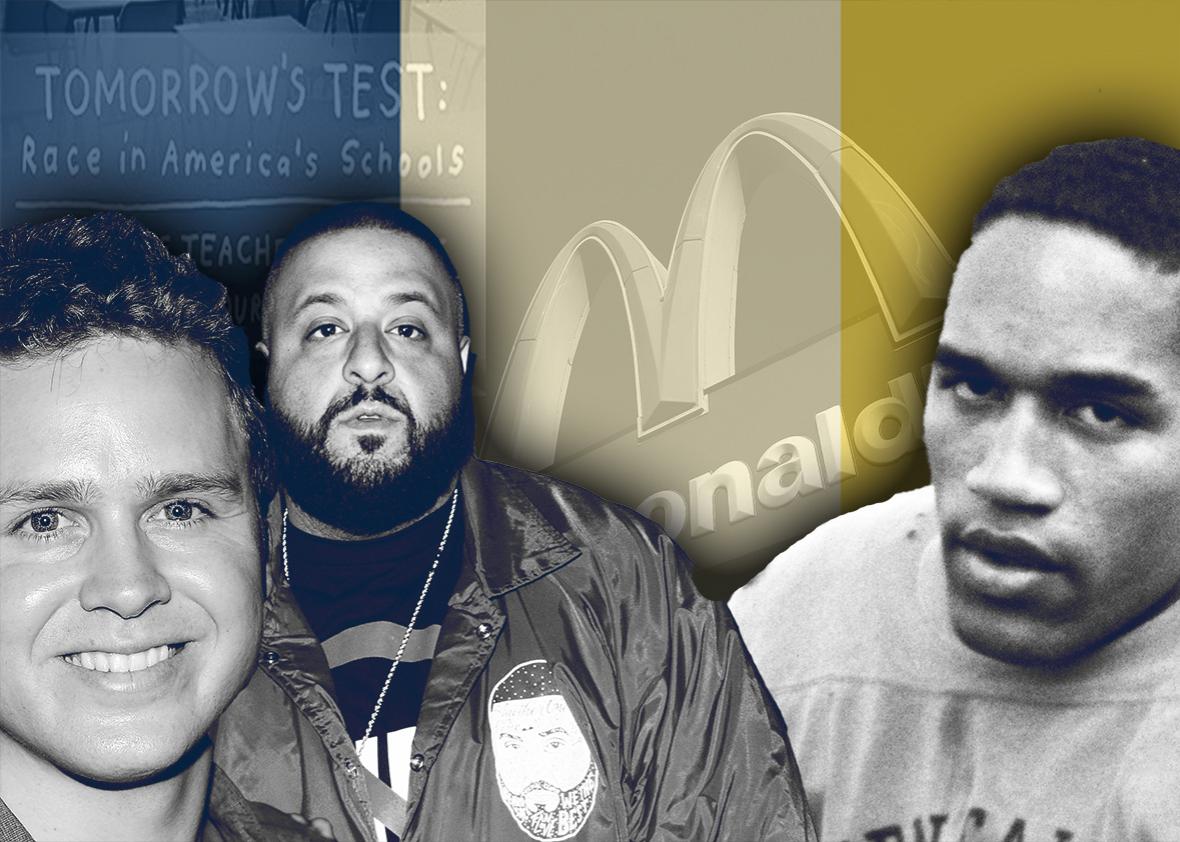Slate’s front page was dominated this week by an amazing 12-part series called Tomorrow’s Test. Editor Jonathan Fischer explains:
America’s public schools have reached an important milestone—their student population is now majority-minority. This fact is both a demographic preview of where America is heading and an urgent reminder of the challenges facing our public schools, which remain deeply segregated.
Slate and our collaborators from the Teachers Project at Columbia Journalism School have spent the past nine months exploring what this moment means for public education, and Tomorrow’s Test is the result. It’s a probing, honest, and deeply humanistic look at how our schools are evolving and a sobering catalog of the inequities that remain.
The pieces in the series take us to public schools around the country. Consider starting with one of these:
- School districts struggle to help refugee kids adapt—how did Anchorage, Alaska, figure it out?
- New Orleans’ teachers are too young and too white. Now its charter schools are trying to fix that.
- In Portland, Oregon, a neighborhood gentrified—and its elementary school didn’t.
As you may have heard, we also launched the Dear Prudence podcast this week, exclusively for Slate Plus members. If you haven’t listened yet, get your first taste of audio Prudie right now.
Other great reads from Slate this week:
- This interview with writers and BFFs Jenny Offill and Lydia Millet will make you profoundly jealous in an enriching way.
- More young adults are living with their parents—and that’s OK.
- ESPN’s OJ: Made in America sounds so great.
One or two decent articles appeared on other websites as well.
Here are some that we liked:
“McDonald’s: You Can Sneer, but It’s the Glue that Holds Communities Together” by Chris Arnade, the Guardian
Arnade documents how, in many forgotten corners of America, McDonald’s provides a welcoming space for lonely people to gather and to form lasting bonds. McDonald’s might not do the best job of nourishing our bodies—but Arnade shows how, in an unlikely way, it nourishes our souls. —Reihan Salam, columnist
“Sallie Tisdale’s Quietly Groundbreaking Essays About Caring for Others” by Laura Marsh, New Yorker
The searching, beautifully crafted, morally complex essays Sallie Tisdale has published from the 1990s on, mostly in Harper’s, pioneered the personal essay boom of today, but remain largely unknown among admirers of authors like Leslie Jamison and Eula Biss. I hope this piece, along with Slate’s own review of a new collection of Tisdale’s work, will correct that. —Laura Miller, books and culture columnist
“When Peak White Privilege and Peak Rape Culture Create the Perfect Fuckshit Soufflé” by Damon Young, VSB
Lost amid much of the justified furor over Brock Turner’s ridiculous sentencing for raping an unconscious woman was the undeniable fact that Turner benefits from America’s sour history of privileging white men. Had he been black, it’s hard to imagine a judge would’ve worried about prison having “a severe impact on him.”—Aisha Harris, staff writer
“The Speidi Files” by popculturediedin2009.tumblr.com
I knew it was a risk to post this interview with Spencer Pratt in Slate’s chatroom, because not all of my colleagues give reality TV its due, but it was too good not to share. Those who take the time to read this (long!) retrospective with the villain from MTV’s The Hills will discover not only some juicy gossip but also Pratt’s hilarious manner of speaking, trenchant media criticism, and poignant commentary on his life’s current state. —Heather Schwedel, copy editor
Also: Ruth Graham recommends this riveting story about how the internet is helping some mentally ill people bolster each other’s delusions. Dana Stevens thinks you should spend the weekend making yourself a William Henry Harrison cake. And Anna Wiener reminded me how weird Wired used to be.
Very Short Q-and-A
This week’s personal question is addressed to Aisha Harris, who witnessed Beyoncé sneezing on Tuesday night.
Slate Plus: Was this your first time seeing Beyoncé?
Aisha Harris: So, I saw B when I was 11, when the original Destiny’s Child lineup opened for TLC, but that wasn’t Queen Bey. So yeah, first time. I consider it the closest I will ever get to seeing Michael Jackson (RIP). But I don’t fully understand what Beyoncé was thinking, having DJ Khaled open for her. I can’t imagine a more lopsided opener–main act combo.
What was Khaled’s performance like?
Despite being called DJ Khaled, DJ Khaled had someone else DJ for him. He stayed in one corner of the gigantic stage for pretty much the whole set and brought out one rapper after the other. So: Khaled would say—er, yell—“Yo, New York! Give it up for …” and out comes French Montana or Busta Rhymes or Fat Joe or T.I. They do a verse and a chorus, then the DJ switches to another beat and that rapper exits off stage.
Still, he makes me laugh, all the time, and we got to be in his Snapchat, so that was cool!
Thanks, Aisha! And thank you for your Slate Plus membership, which makes our journalism possible. See you next week!
Gabriel Roth
Editorial director, Slate Plus
–
P.S. Audible is still offering Slate Plus members a complimentary audiobook of Willa Cather’s My Ántonia, our current selection for A Year of Great Books. Don’t forget to claim yours!
